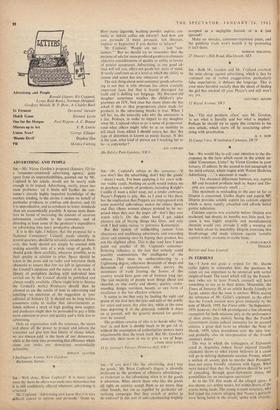Advertising and People
Ronald Clatter, Kit Cop paid. Lynne Reid Banks, Norman Shrapnel, Geoffrey Mini.s.h. H. P. Dow, A. Charles Buck
In Ferment Desmond Stewart Match Game Bernard Levin
One for the Morgue Paul Rippon, A.C.-Dunne Mirrors up to Art F. R. Leans
Union Now? George Edinger
'Monde Devil' Daphne Slee
PR Monica Furlong ADVERTISING AND PEOPLE SLR,—Mr. Victor Gordon's proposal (January 12) for a 'consumer-orientated advertising agency,' quite apart from its impracticabilities, pointed out by Mr. Copland in his article, would not be nearly wide enough in its impact. Advertising, surely, poses two main problems: (a) it limits still further the con- sumer's already highly imperfect knowledge of the market, tending, in the claims it makes on behalf of particular products, to confuse and deceive; and (b) it is unproductive, and so conduces to lower standards than are economically possible. A means must there- fore be found of increasing the amount of accurate information available to the consumer, and of directing at least some of the producer's expenditure on advertising into more productive channels It is in this light, I believe, that the proposal for a National Consumers' Council, made recently in several quarters, should be seriously considered. How- ever, this body should not simply be content with making scientific tests of a wide range of goods. It should grade them carefully, wherever possible, as to their quality in relation to price. Space should be taken in the press and on radio and television (both channels) to ensure that few arc left in ignorance of the Council's existence and the nature of its work. A library of pamphlets dealing with individual tests carried out by the Council should be published and always readily available. (These might help to finance the Council's work.) Producers should then be allowed to use the results of tests in advertising and labelling—an extension of the suggestion in your editorial of January 12. It should not be long before consumers came to realise that advertisements or labels without a mark of high grading were suspect, and producers might then be persuaded to pay a little more attention to price and quality and a little less to advertising.
Only an organisation with the resources, the status and above all the power to protect and inform the 'consumer can give him that liberty of choice which, we are always told, is the basis of our democracy, while at the same time promoting that efficiency which alone can make our democracy economically defensible.
RONALD GLATTER
3 Burlington Avenue, Kew Gardens. Richmond, Surrey






































 Previous page
Previous page